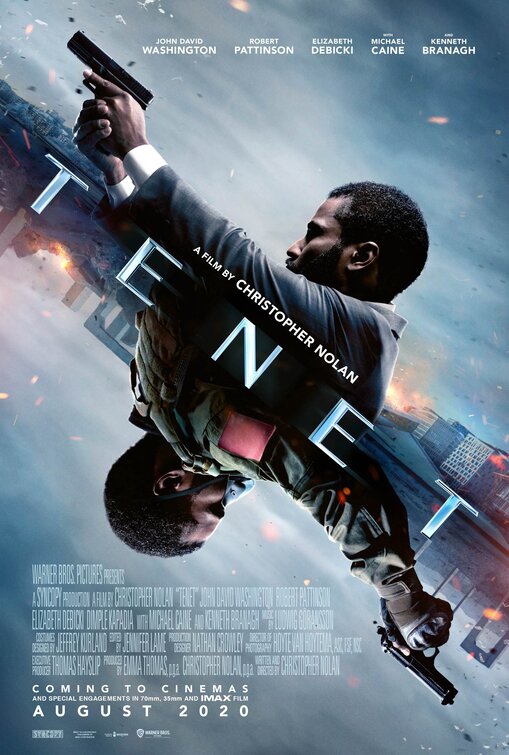Time Runs Out
Director
Christopher Nolan
Starring
John David Washington
Robert Pattinson
Elizabeth Debicki
Kenneth Branagh
A CIA agent, played by John David Washington, is sent on an undercover mission to extract a target at the Ukrainian national opera house but the mission results in his torture and eventual death. Learning that the cyanide pill he took was a fake, putting him into a coma rather than killing him, the agent is drafted by a secret organisation and briefly told about inversion, where certain objects and people are moving backward through time, while everything around them continues to move forward. Paired with Neil, a handler played by Robert Pattinson, they uncover a plot by Russian arms dealer, Andrei Sator [Branagh] to bring about a war which could potentially lead to the end of the world. Seeing the arms dealer’s wife (Kat [Debicki]) as an angle to exploit, the agent is quickly swept up in a world of intrigue, misdirection and peril.
On its release, I bemoaned Interstellar for being filled with glorious visuals but marred by an unfortunately lacking story which was surprisingly linear and littered with trite platitudes. I’m sorry to say, Tenet suffers an unfortunately lacking story paired with unfortunately lacking visuals; nothing about this world where people running both forward and backward through time feels nearly as impressive or mind blowing as it should, even when it’s blatantly trying. I should clarify that this is by no means a bad movie, I have no problem with a film that requires you to focus and commit to the story to understand what is happening, but the impact that the marketing hyped and the opening scene so blatantly promised is never truly delivered.
**As with all my reviews, this is less a recommendation and more a conversational breakdown, so there will be huge plot spoilers from here on out. It is advised to watch the film before reading further, or to skim ahead to my In A Few Words summary and final rating**
Nolan has gone on the record in the past stating that he would love to direct a James Bond film, or at the very least that he draws a lot of inspiration from them. This influence plays heavily on many of his scripts but nowhere is that more prevalent than in Tenet. A maniacal Russian out to destroy the world, an agent working undercover to subvert this plot, high speed car chases, lavish international locales, thrilling shoot-outs, sharply dressed suave wise-cracking individuals and at the heart of it all, a beautiful woman who needs saving. Much like James Bond, the lead character is a pawn with little agency (it is then later revealed that he is his own pawn but there’s no added closure or catharsis to this revelation), given a mission and pointed in a direction but in no real danger of failure. The major difference is that Q branch’s various gadgets are substituted for a single gimmick. So let’s talk about that gimmick.
Countless films have covered time travel with varying degrees of success. Recently, we’ve had some extremely good examples from Looper, Source Code and a personal favourite of mine, Dark. Each of these sets out their own time travel rules and stick to them in a way that both allows the audience to understand what is going on while remaining true to the narrative events. But this film deals with time inversion, which is a little different; specifically it deals with the “travel” part of time travel, the action of moving backward through time while others move forward. This concept has the potential to be clear or convoluted depending on the script, exposition and visual storytelling. Somehow, in a feat of mad genuine ingenuity, it’s both.
Parts of this story are incredibly interwound and require attention to follow and process properly, other times they’re so painfully signposted that it goes so far as to ruin what’s to come. An unidentified woman dives off a boat, a line is said about physics working differently like fire turning to ice, demanding to know who an attacker works for without taking off the individual’s mask – you don’t have to know the complete formula of every time travel film to understand what these things mean: that woman you saw was you from the future, the following scene will have fire that turns to ice and that man attacking you is also you from the future. There is truly nothing worse than a predictable movie; to have a hunch in the first twenty minutes and then watch for two hours as your predictions come true but your expectations were possibly set too high. We give Shyamalan a lot of grief for his seemingly mandatory twists but Nolan has similar traits that are often praised. Knowing the movie played heavily with time, I worked out pretty much everything and that isn’t meant as a boast, it’s a lament.
These two elements – the James Bond spy thriller and the high-concept science fiction – are constantly at odds, refusing to truly merge. As such, it took a surprisingly long time for the film to properly grab me (after the in-your-face opening sequence) because the significant grounding leaves most of the film stagnant, never truly becoming fantastical. The time inversion concept is introduced but then side-lined just as quickly and used so sparingly that it is almost not worth having. In the world of Inception you are told enough to get by but remains very scant on details. Despite this, the effect is used well and often and the main principles are reinforced from those that understand to those who are new to the concept; so it works. Here, the world building doesn’t feel fleshed out enough, the impact of objects travelling backward and forward in time being treated with a dismissive “future people made it” isn’t enough and having an early explainer that we are finding more and more relics from a future war that possibly wipes out our way of life but doing almost nothing with that (to say nothing of never actually showing it) is not enough.
One thing that does become apparent very quickly is that this is a world devoid of consequence. There is no real impact for the average citizen because this does not concern them. You’re either in the loop and part of the temporal pincer movement or you’re background fodder. As with The Matrix Reloaded, suddenly Neo’s actions inside the matrix didn’t feel as under threat as the previous instalment because we knew it was a simulation and they could simply be pulled out; we were endlessly told it wasn’t real so we didn’t worry as much. Police, military, the rich, the poor, none of these people matter, all that matters is the next scene.
Supporting roles are few and far between but seemingly everyone is in on inversion, so there’s rarely a moment where the audience is part of a conversation that truly explains what is going on. Most know the stakes, most are working (knowingly or unwittingly) for the future version of the protagonist and there’s little real world impact. Even as far as reaction shots from bystanders when plans are being drawn up to crash a plane or when cars are screeching across the road in reverse. The only time we really see the general public is at the opera and, thanks to gas, they are almost instantly put to sleep. I feel there’s a sort of metaphor going on there but I can’t quite make it out.
In truth, inversion exists solely to justify cool set-pieces, as is the problem with all bad action movies, and the more time you spend thinking about it, the less the movie functions. For example, we are told that no one knows how something becomes inverted but this faceless group of paramilitary types seem to have access to multiple machines in Norway, Estonia and ..somewhere else that they can process a whole battalion through. Yes, these are minutiae but they are the fundamental drive for the movie and if they aren’t fit for purpose, your movie has essentially failed.
In an incredibly small role, Clémence Poésey offers Washington’s character his first explanation about the nature of inversion but immediately adds not to think about it, not to indulge in their backstories and teases some immense future war before disappearing from the movie entirely. My highlighted quote listed below is one of her lines that tells Washington (and by extension the audience) don’t try to understand it, just feel it – and while you can undoubtedly feel the awe of the spectacle and ribcage-rattling sound, I didn’t feel much of anything for these characters and their plights but that isn’t for lack of trying from the cast.
The biggest kick in the teeth for me was giving two incredibly charming actors utterly charmless dialogue. Pattinson has a little fun with his role and you always get the impression he knows more than he’s letting on but the reveal is pretty underwhelming. Then you have John David Washington who thoroughly impresses me in everything he turns up in and while he performs admirably, some of his dialogue and interactions are insultingly flat. The script even goes so far as to have the protagonist actively saying the words “I’m the protagonist” multiple times which is annoying in and of itself but to make matters worse, Washington’s character is actually credited as The Protagonist. The nameless lead trope worked well in something like Layer Cake and felt like it actually had a purpose but with Tenet, there’s no reason not to give him a name, especially as there’s no subversive twist reveal that he isn’t actually the protagonist or something like that. Some may try to counter “ah but he wasn’t the protagonist …yet” with a smug grin but that hardly warrants this move. Despite this, I think these two carry the film extremely well and exude gravitas and physical prowess during the action scenes.
On the other end of the spectrum, Kat is terrible. To be clear, Debicki isn’t terrible, she’s an absolutely fantastic actor who elevates the role as much as possible. But her character is incredibly frustrating. The Protagonist’s mission is to get close to Sator to ascertain the location of this doomsday device and his entry point is Sator’s estranged wife. So far that’s fine (and very Bond) but whenever a plan is put in motion, one of the key things that seems to derail everything is Kat. On multiple occasions she scuppers seemingly every plan because she’s just too damn emotional and her only motivation is to reunite with her son, which is just the worst kind of writing. I mean, I know a parent’s bond with their child is strong and they would do anything for them but when told about “Reversing entropy, killing everyone and everything” her only response is “including my son.” Yes obviously including your son! Everyone and everything includes him. To reiterate, this is less the fault of the actor and more the ham-fisted reiteration that this character has one sole driving force and we, the audience, need to be reminded of it as often as possible. What is never really explained is why Washington’s character cares so much about Kat. There is seemingly nothing remarkable about her situation but he is drawn to her, prioritising her needs over that of the objective. The motivation isn’t sexual or altruistic (which is refreshing) and goes beyond necessity or survival but without a clever or relevant alternative, the only remaining answer is “plot,” which is weak.
To change tack and focus on some positives, we need to talk about how this film was constructed. The plane highjacking scene is an audial assault of music and sound to invoke true scale and terror over something that we’ve actually seen many times before on-screen. This is extremely clever, injecting a fairly simple action sequence with some much needed life and reality. The score is also very intricately designed with elements that are running both forward and backward at the same time, making for a very kinetic and unique sound. It’s also worth noting that said score was composed by Ludwig Göransson, as it’s extremely reminiscent of Hans Zimmer’s style – to the degree that everyone will simply assume it was Zimmer despite him being busy on Dune. But even this aspect doesn’t get a clear pass as much of the dialogue is lost at times, taking a backseat to the intense thundering sound design – which isn’t a major headache in and of itself, except the film expects you to keep up with so much that is usually only found in muted, muffled, whispered or altogether smothered dialogue.
The cinematography is equally tricky to praise. On the one hand, doing so much in-camera is very commendable and when you see a sprawling vista, you can tell they were actually there. A good parallel would be something like The Wolf Of Wall Street, wherein so many lavish locations are green-screened. Yet while they’re done so well, to the point of almost seamlessness, there’s something to be said for what you capture with a camera. But when the film isn’t busying itself with action set pieces, we are treated to fairly mundane conversations presented with incredibly rudimentary medium shot-reverse-shots, linked together with extremely jarring editing, as if whole transitional scenes are missing. I don’t know if this is due to Nolan working with a different editor or just what was shot at the time but unlike Insomnia or Memento that toy with your perception of memories and dreams, this makes an actively ostracising movie even more inaccessible.
While I’ve spent a few thousand words eviscerating this film, I want it to be known that it is not without merit. There are plenty of powerful and exemplary moments, I’m just irked because a great deal of potential feels squandered. As with many Nolan features, few will say they disliked it for fear of being told they “just didn’t get it.” Well I got it and I still disliked it because there wasn’t a great deal to get. In a way, it’s akin to The Dark Knight Rises which also tried to be clever and convoluted but felt like it was crammed with filler and yet somehow incomplete. Little things like not returning to the opera scene, while not entirely necessary to retread everything, left the finale feeling like there were too many loose ends and pieces to be revisited. And while I’m all for an ambiguous you-don’t-need-all-the-details denouement, some details are requisite for any sense of satisfaction.
To round this review off, Tenet is a remarkably unambitious feature that isn’t nearly as smart as it purports to be. The problem with a high-stakes science fiction drama with a countdown to armageddon is that when time is relative to the audience, it nullifies the events. The self-fulfilling prophecy of it all means that once you realise the movie exists in a world where, as Pattinson’s character says, “what’s happened has happened,” you know they’ve already won, you’re just watching the leftover inertia pushing it to the conclusion. Stripped of urgency with an interesting sounding future war that never actually happens, the whole thing leaves you cold, repeatedly telling you don’t try to understand it but to feel it. But on inspection, the only feeling present is dissatisfaction.
Release Date:
26 August 2020
The Scene To Look Out For:
The biggest surprise for me was that nothing about this movie wowed me visually. The only thing that really stood out was the double-exploding building. In the final temporal pincer assault on Sator’s compound, we have a highly co-ordinated strike wherein a crumbled structure is targeted by both the alpha and beta teams, one going forward through time, the other going back. In an almost bell curve, the building begins to erect itself with a reverse explosion sealing it, only for the bottom layer to then be blown out and the whole thing falls again. It’s a very cool concept in the middle of a relatively well thought-out battle. Until you ask yourself why this happens. What was the point of this harmonised strike? The film tells you it’s a distraction but in truth, it’s just an excuse for spectacle. It’s there because the film requires a big action beat. And after the moment for the beat has passed, it has little relevance to the story and seemingly little impact on the battle itself. Which is a damned shame.
Notable Characters:
Kenneth Branagh plays the villain of the piece, a Russian oligarch arms dealer who is unsympathetic from start to end. A self-serving abusive monster who wants to bring about the end of the world because he too is dying. Knowing this, Branagh’s performance and energy feels fitting. The trouble I have is a passing line or two of dialogue that tries to make him a little relatable. Toward the end of the movie he explains to Washington that the world dies because of us and therefore mankind should be wiped out with this entropy device. It’s the same move as Infinity War and part of a trend that any environmental message of radical change only comes from a villainous individual who wants to wipe out humanity. Knowing this, The Protagonist tells the antagonist that it doesn’t matter. But unlike a post Thanos sense of hope or an Ad Astra epiphany that we need to take care of the earth because there isn’t much out there, the audience is left numb. The only thing we have to cling to is the rich lady gets to be with her kid, who is little more than property to be won back in a bet, and the fate of the universe is decided by either a billionaire arms dealer or a nameless CIA agent and that is a pretty bleak existence.
Highlighted Quote:
“Don’t try to understand it, feel it”
In A Few Words:
“A disappointingly undercooked experience, saved only by the calibre of talent involved behind the scenes and in front of the camera”
Total Score: 3/5
![The Red Right Hand Movie Reviews [Matthew Stogdon]](https://reviews.theredrighthand.co.uk/wp-content/uploads/2021/12/cropped-header1.png)




